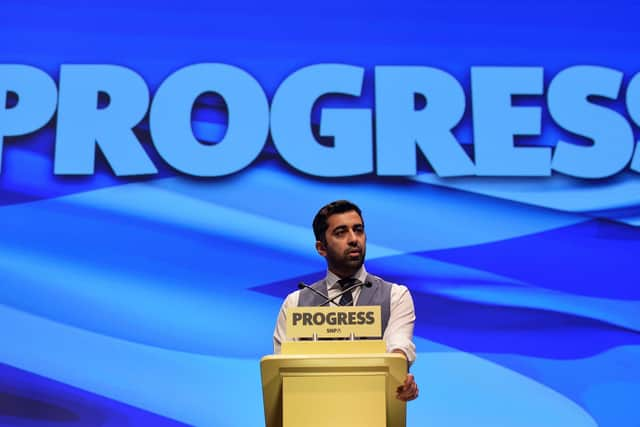Scotland may have a new First Minister, but it's still the same old SNP, same old shambles – Christine Jardine
Frustration that a new First Minister seems intent on driving us down the same route of wreckage-spattered constitutional confrontation as the two previous incumbents of office. Frustration that his ministerial appointments fail to address some of the most serious issues facing our population. And frustration that, under the SNP, Scottish politics is becoming increasingly like a bad comedy with ridiculous storylines.
This change of leader was an opportunity to take stock and establish a fresh approach. Build a better relationship between our two governments and get on with the important task of repairing the NHS and improving public services.
Advertisement
Hide AdAdvertisement
Hide AdDuring the Easter parliamentary recess, I met a number of community representatives, business people and constituents for whom the current economic climate is creating far more pressing problems than our Holyrood representatives appear to appreciate. From those struggling to cope with the cost-of-living crisis, which is continuing to add to our disastrous poverty levels, to our most iconic industry facing potentially disastrous proposals, there is almost disbelief about the attitude of those responsible for our well-being.
We may have a new First Minister, but it is still the same old SNP, same old shambles. The past week alone has had more than its fair share of head-on-desk moments. Most prominently perhaps, a court challenge which could take years, cost millions and do nothing to help anyone, least of all those the controversial Gender Recognition Reform Bill aimed to help.
The decision of the SNP/Green government to challenge the UK Government over its use of the section 35 order to prevent the bill becoming law was not unexpected. But rather than more confrontation and delay, I would have preferred to see progress on the issue.
Given the Secretary of State said in parliament that there is a version of the bill that he could accept, why not press to find out exactly what that is? Why not find a solution that puts an end to what has been a difficult debate for so many people and achieves all parties’ stated aim of making life easier for a small but extremely vulnerable group of people in society, while reassuring those with doubts about aspects of the legislation.
And who knows, perhaps if the SNP/Green government could take a more positive, conciliatory approach on this issue they might find that success elsewhere will follow? Bringing positive change and progress to people’s lives could, they might find, prove more rewarding than bitter division and gridlock.


There is certainly no shortage of places they could look to make that progress and find common cause with those of us in other parties desperate to alleviate the issues facing our constituents. If, for example, the First Minister was revealing in his Programme for Government this week that he would, after all, create a dedicated minister for older people once again, rather than one for independence, he might find previously critical voices would welcome the move. Not least from those working in the voluntary sector to alleviate the loneliness felt by 100,000 elderly Scots every day.
Or perhaps by focusing on addressing the poverty which blights the lives of one in five Scots, he might find that praise follows. An opportunity presents itself this week with a debate at Holyrood entitled “Supporting Scotland with cost of living and reducing child poverty”.
Let’s see some positive policies. I want to see our governing parties come up with a joint UK-wide approach rather than blame distribution. I am not impressed by detailing how the situation faced by older people in Scotland compares with England, Wales, Northern Ireland or anywhere else for that matter. Comparisons don’t make it better, but action will.
Advertisement
Hide AdAdvertisement
Hide AdWhat Scotland needs more than anything else at the moment is the feeling that those in charge, both at Holyrood and Westminster, know what they are doing. That we can be sure that our children’s future is safe in their hands and that our parents, or ourselves as we grow older, will be cared for by the public services we have paid for all our lives.
The current constant inter-parliamentary conflict is helping none of us and frustrating all of us. This week at Westminster we will debate a finance bill which, if approved, will raise the taxation level on spirits to levels which are causing alarm across the industry. Few sectors have achieved the global success that our spirits have. Primarily whisky, but increasingly gin and vodka too.
Last year Scotch whisky achieved record exports, despite the challenges presented by Brexit, and yet that is to be rewarded by record levels of taxation. I, along with my Liberal Democrat colleagues, will be voting against the measure. What could we achieve if all the Scottish MPs worked together for this and other industries, regardless of party affiliations and constitutional differences.
Or if we could revive the sort of political partnership which worked so well for Scotland in the first decade of devolution. That was a time when our two governments – or government and executive as it was then called – saw themselves as partners for Scotland. What progress could we make for our people if we took that approach again.
For too long we have toiled under the SNP and now Green shambles amid constitutional confrontation. This is not the country I want to live in. It is hard to think that the case for independence might be better served by a failing country and I do not want to believe it is part of the Scottish Government's strategy.
It is a truth universally acknowledged that more is achieved by working together. Progress must be achieved, for all our sakes.
Christine Jardine is the Scottish Liberal Democrat MP for Edinburgh West
Comments
Want to join the conversation? Please or to comment on this article.